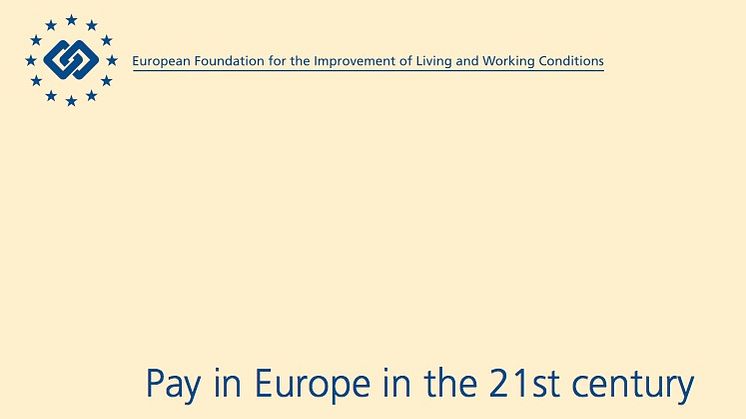
Press release -
Wage setting mechanisms and minimum wages under the spotlight in Europe
(Dublin, Ireland): While wage-bargaining regimes have remained stable over time in many countries, the post-crisis period after 2009 saw an acceleration of collective bargaining being delegated to more decentralised bargaining structures and reduced bargaining coverage. Comparing collectively agreed pay with actual compensation, the Central and Eastern European countries are catching up with European averages. The Pay in Europe in the 21st century report provides comparative time series on wage-bargaining outcomes across the EU Member States and Norway. It also investigates the different systems and levels of minimum wages in Europe at present, evaluating the implications of a hypothetical scenario of a minimum wage set at 60% of the median national wage and discussing the possibilities and difficulties of coordination in this matter. The report will be presented to government representatives of EU Member States on Friday 7 March 2014.
The issue of wages has attracted particular attention at European level since the onset of the economic crisis. Changes in economic governance, notably within the European semester, have brought discussions on wage-setting mechanisms to the fore. While overall, wage-bargaining regimes have remained rather stable over time in many countries, the most substantial changes were seen in programme countries and in other Member States facing more difficult economic situations in the post-crisis period after 2009. The report found, however, that the acceleration of decentralisation, with more bargaining being delegated to the company level, has not affected the predominant level of central or sectoral bargaining in most Member States – at least, not for the time being.
When looking at actual levels of compensation during the period between 1998 and 2012, the report found that actual compensation per employee rose on an annual average between 0.9% in Italy and 22% in Romania, with the European median at 3.5% per year. Higher growth rates of actual compensation per employee, mainly in the new Member States, reflect how the countries in Central and Eastern Europe are catching up with European averages, ranging from 4.5% in Croatia to 10% in Latvia. The lowest increases took place in Italy, Germany, Austria, Cyprus and France, all between 1% and 3%.
In terms of wage share within the economies, the overall trend was that of a declining one in most Member States (except in the Czech Republic, Finland and the United Kingdom, where the wage share is growing). However, in the majority of countries with decentralised bargaining systems and low coordination, the wage share declined during the crisis. In contrast, in the majority of countries with other systems, real unit labour costs increased.
The report found that increases in collectively agreed pay were lowest in the country group with sector-level and highly coordinated bargaining, while they were highest in countries with intermediate-level bargaining and a low degree of coordination. At the sectoral level, disparities in terms of collectively agreed pay have increased over time between the public sector (local governments and civil service) and the private sectors covered in the study (metal, chemicals, retail and banking), mainly because in the public sector of many countries across Europe, pay was frozen or only moderately increased.
Collectively agreed pay remains an important driver of actual pay in many countries, and it is the component of pay that can be most influenced by the actors involved. Collectively agreed pay refers to basic wages only, while actual wage bills include overtime payments, bonuses, stock options or other forms of variable pay.
Minimum wages can be considered as a cornerstone of the ‘European Social Model’. They exist in all EU Member States, even if they are set up and established in very different ways and do not cover all those who are employed in all Member States. In general, minimum wages are not explicitly aimed at reducing wage inequality and poverty, but at establishing a minimum rate under which any employment relationship is considered to be unacceptable - in other words, the establishment of morally based labour standards.
In the majority of EU Member States, minimum wages are set by government regulation. Germany together with Austria, Denmark, Finland, Italy and Sweden are the exceptions, where minimum wages are set by collective bargaining agreements and do not cover all workers. Monthly statutory minimum wages or average collective agreed minimum wages in EU Member States are estimated at between €122,7 (Romania) to €1,788 (Luxembourg).
The report evaluates the implications of a hypothetical scenario of a minimum wage set at 60% of the median national wage and discusses the possibilities and difficulties of coordination in this matter.
The quantitative impact of such a policy would vary considerably across countries: it would be largest in the Baltic countries, Germany, Ireland, Poland, Romania and the UK, and smallest in Belgium, France the Nordic countries, Portugal and Slovakia. Germany stands out from the rest, where almost one in four German workers would see their wages increase with the establishment of a minimum wage threshold of of 60% of the median.
The report also found that a minimum wage set at 60% of the median would disproportionately affect women (21.5% of female workers versus 11% of male) and young workers (35% of those in 20-24 years age group, 16% of those in 25-29 age group, versus 12% of those in 30-55 years age groups). The biggest impact would be in the personal services sectors and in small companies.
Related links
Topics
The European Foundation for the Improvement of Living and Working conditions (Eurofound) is a tripartite European Union Agency, whose role is to provide knowledge in the area of social and work-related policies. Eurofound was established in 1975 by Council Regulation (EEC) No. 1365/75.
For more information about Eurofound and its work, and free access to all our data and findings, visit our website and follow us on these social media channels: Twitter, Facebook, Google+, YouTube, or Flickr.


